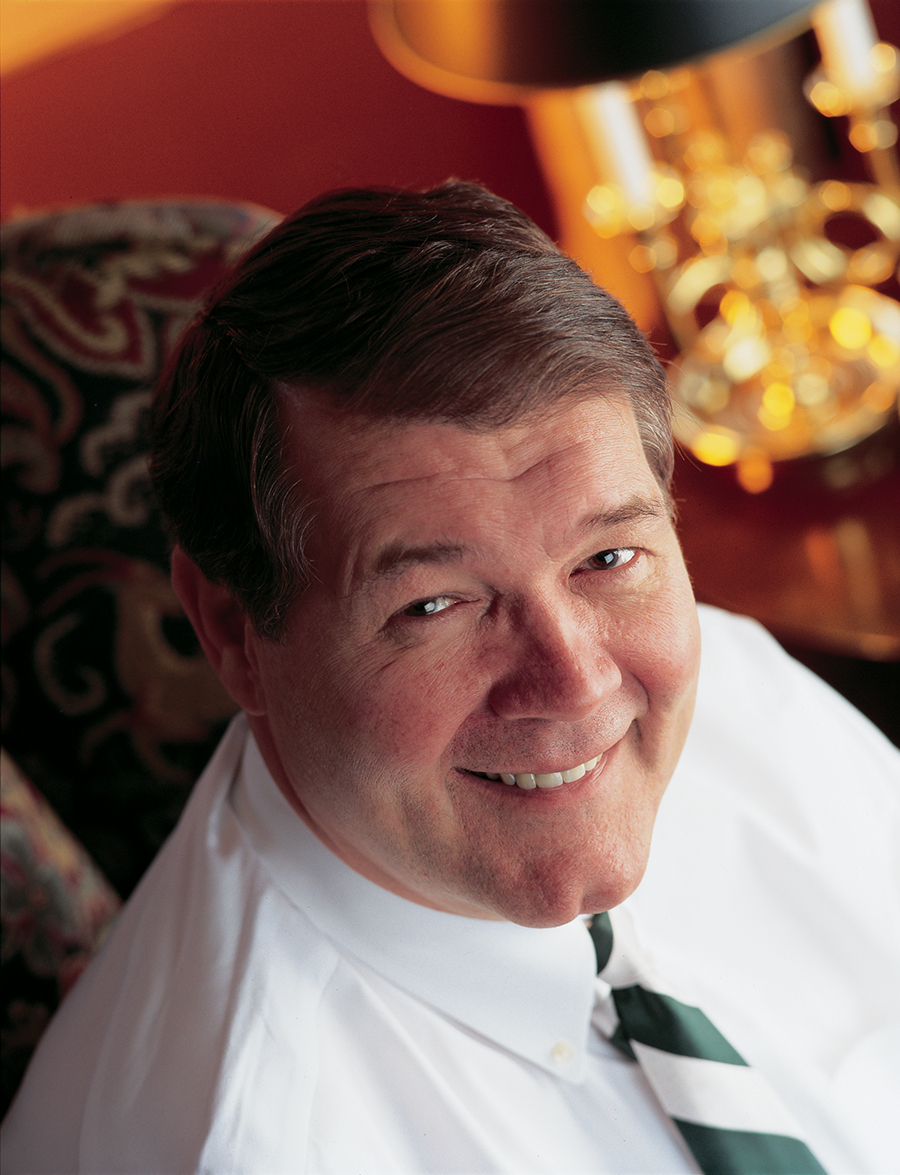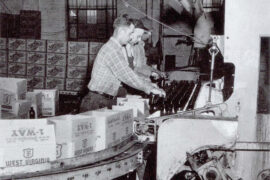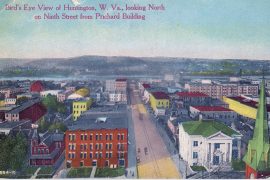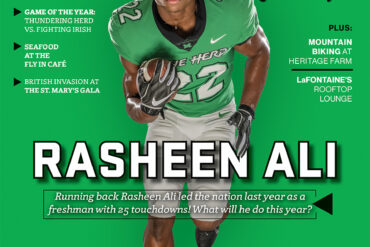A former legislator and accomplished university president stands ready to lead Marshall University to the next level
HQ 38 | SPRING 2000
Following the departure of J. Wade Gilley last summer to the University of Tennessee, the search committee for Marshall University’s newest president was faced with a difficult challenge. After all, Gilley and his eight years of progress would be a hard act to follow. And there were time constraints to consider as well — the school needed a permanent president in office before the West Virginia Legislature convened in January 2000 and began allocating funds for higher education. The committee found the right leader for the job in Stephen F. Austin State University (Texas) President Dan Angel. Angel brings an impressive record of growth and transformation from his experience as the president of three colleges and one university. In fact, his eight years at Stephen F. Austin were described by his peers as “phenomenal.” A three term member of the Michigan Legislature, he also possesses a deep understanding of the political process which is omni-important to his current role. A native of Detroit, Angel earned his B.S. and M.A. degrees in Education at Wayne State University and his Ph.D. in Communications from Purdue University. A prolific writer and editor, he has written three books, edited three others and penned numerous articles. His leadership skills are impressive, garnering him numerous awards including “Public Administrator of the Year” in Austin, Texas, “Pacesetter of the Year” by the National Council for Marketing and Public Relations and “Exemplary Leadership Award” by the American Council on Education. During his interviews with Marshall, Angel wowed the search committee, was the unanimous choice of the classified staff and was endorsed by the students. At 6’4”, 210 lbs., it is easy to see that he played football as a linebacker in college. He is married to the former Patricia Schuster of Dearborn, Michigan, who he met on the Debate Team in college. Of his wife, Angel says, “I married way above myself.” HQ Editor Jack Houvouras sat down with Marshall’s 34th president in February, just a month after he had taken office, to hear his views on the future of the university. Despite the fact that he had been logging 16 hour days, Angel appeared relaxed, animated and candid. And yes, he was indeed sporting a green jacket and tie.
HQ: What were your first impressions of Huntington and Marshall University?
ANGEL: When I flew in for the first time last fall, I noticed the changing colors, the hilly landscape, and an abundance of trees. Huntington is a beautiful area! It reminds me a little of San Francisco with all the homes up on the hills. The campus looks like a university should. The John Marshall statue in front of the library gives you a special feeling of the heritage that goes with the name. I was very impressed with the campus and the community. People here are friendly and genuine. They show great pride in their university and community.
HQ: How would you describe your first day on the job?
ANGEL: You’re sitting in your office and meeting an array of people who know more than you do about Marshall University. [Laughs] And that’s a little intimidating because while you know that you’re capable of the new assignment, there’s still a major gap between what you know about the university, the history, the major issues, and you know you have a large learning gap to fill as quickly as possible.
HQ: How hectic have your first 30 days been?
ANGEL: I would describe them as torrid. [Smiles] There were a lot of things going on. I feel like I’ve been here much longer than a month. During the first thirty days, we’ve met virtually all the legislative leaders in Charleston, two of the three congressmen and one of the U.S. Senators. I’ll be traveling to Washington next week to meet the remainder of that group. We’ve also met with the editorial boards of three newspapers, the classified staff, faculty and student leadership. So, I feel reasonably well indoctrinated after the first month.
HQ: The classified staff gave you a unanimous endorsement. What do you attribute that to?
ANGEL: Height, weight and alphabetical order. [Laughs] Seriously, it was deeply appreciated! It’s very unusual when you have more than one candidate to have a unanimous endorsement. Hopefully, it meant that we made contact that day and I let them know that everyone at this university is important. Not just the students, not just the faculty, but every single person.
HQ: What has been the most pressing issues facing you to date?
ANGEL: The state Legislature because they are revamping all of higher education this year. They are talking about the possibility of changing the governance of our Community and Technical College, offering more masters programs around the state, and they are talking about higher selectivity for students. Those issues and the governing and funding of higher education are up for grabs this year. It’s a very significant legislative session.
HQ: Why do you think they are trying to make these changes now?
ANGEL: The state economy has experienced growth at about one percent in recent years whereas the national growth is five or six times that amount. When you look at some of the indicators in the state such as personal income, we’re ranked number 50 in the country. We just haven’t been able to take off and the state leaders are trying to isolate the cause and come up with a solution. Jobs are available everywhere in the USA, but they’re not uniformly available in West Virginia. We need to make economic development happen here. Universities have had three major roles throughout recent history: teaching, research and community service. I strongly believe that universities should now take a fourth major priority as part of their mission — economic development. One of the ways we can help is in the area of basic literacy. Other areas are technical training and retraining. The Legislature is saying, ‘Look, we have a lot of people that don’t have the basic skills to do needed jobs. We’re not going to have employers coming here until they know that our people are ready to perform the new jobs.’ The new information age is here. Ninety-five percent of the jobs in America involve some kind of technological information. So we’ve got to work toward that end. That’s the single largest issue facing this state.
HQ: You made a point of driving up to Morgantown to see WVU president David Hardesty. Tell us why.
ANGEL: West Virginia has a very finite amount of fiscal resources, one of the tightest in the nation. To me, that means you’ve got to plan wisely at the state level. And universities have a key role. I went to visit President Hardesty to make his acquaintance and to start to build some communication that would ultimately benefit the state of West Virginia. [Smiles] Certainly, the football game was discussed. I’d love to see us play.
HQ: How do you plan to work with President Hardesty?
ANGEL: If President Hardesty and I sit down and tell the Legislature, ‘This is what we need to do,’ think how powerful that would be instead of us arguing on different sides of an issue. WVU and Marshall are the Hertz and Avis of this state and we need to get our automobile fleets traveling in the same direction whenever possible. I was pleased when I went to Morgantown that we got to spend about two and a half hours together. Later the same month, he came down to visit me in Huntington for another two and a half hour session. So we’ve had five hours of one-on-one conversation on major issues and that’s going to continue through the legislative session and I hope beyond.
HQ: For years, the rap has been that the Legislature has given far more funding to WVU and Marshall falls a distant second. How do you address that problem with the Legislature?
ANGEL: WVU has major land grant status bestowed by a federal act of congress. That gives WVU a certain number of programs and services that they provide across the state. What people don’t realize about Marshall University is that we also have statewide service and impact. We have our major campus in Huntington, the Graduate College in South Charleston with a statewide mission, a Medical School, four Byrd Institutes and a number of other services provided throughout the state. So Marshall University has statewide presence and stature. We’re just a different kind of institution. We’re not on the same mission as WVU, but we have a very strong mission of our own. I’m very excited about how far Marshall has come in the past 10 years, but I’m even more excited about what we’re going to do in the next 10 years!
HQ: You met your wife, Patricia, on the debate team.
ANGEL: Yes. [Smiles]
HQ: Did you argue a lot or debate the issues back then?
ANGEL: We did meet on the debate team, but we have our best debates now! She’s quite a lady. I’ve known some men who say they married above themselves. I certainly did. She’s been a good, strong partner and role model for our children. We’ll be celebrating our 35th anniversary next July.
HQ: Give us an example of something you and your wife have debated?
ANGEL: One example would be how we raised our children and what kind of lessons they should learn along the way. There were a lot of family issues. Those are really the most important when you strip everything else away. We’re a pretty good match as far as socializing. Patricia is very gregarious. She loves to be with people. I think if she had her choice of being with me for a day or with 100 people, she’d pick the 100 people! [Laughs]
HQ: You are an author having written several books. Explain to our readers the desire to write.
ANGEL: My first urge to write was when I did a biography on former Michigan Governor George Romney. I was working on a dissertation at Purdue University when he became a possibility for President of the United States. So when I was 25, I wrote my first book…265 pages, hardbound. Undoubtedly, it’s the best thing I ever wrote because I poured myself into it day after day. Even though I’ve done six books now — three as an author, three as an editor — the best was my first, because when I finished, I felt like I had “nailed it.”
HQ: Difficult challenge isn’t it?
ANGEL: Yes, but you gain command of a topic when you write about it. It forces you to think through and connect all the pieces. Passive thinking is one thing but when you have to speak about and write about it you really have to actively analyze, organize and articulate your thoughts. To see it through to the end is a great feeling. There’s kind of a rush you get from completing that kind of task. I’m sure you feel that yourself.
HQ: You’re a former linebacker….
ANGEL: I call myself a “resentful linebacker.” [Laughs] I wanted to be a quarterback but they told me I was too big. That was then. Today, I wouldn’t be. Now, at 6’4”, 210 pounds, I would be the perfect size.
HQ: Yes you would. Tell us about your glory days. Were you a good player?
ANGEL: I don’t think I was an exceptional player. Football was enjoyable but it wasn’t the major part of who I was. It wasn’t the major reason that I attended college. The biggest play I remember making was blocking a punt that made a difference in one of the games we won. Whenever you have an impact on the outcome, that’s when you’re proud of your effort.
HQ: Speaking of football, it’s common knowledge that most all of the faculty at Marshall have a longstanding disdain for athletic endeavors. How do you deal with that as someone who has to balance academics and athletics in a community that is crazy about its football and basketball?
ANGEL: I don’t think that’s true of everyone. I’ve always thought that when people talk about ‘the faculty,’ they seem to want to do that in one big group, and say, ‘everybody.’ I’ve never found that true of faculty. What you generally find is that some faculty are for something, some faculty are against that same thing and a large number of faculty are in the middle with differing points of view and shades of gray. I see the faculty as many different groups, not as any one gigantic set. You can make a strong case that the football program here at Marshall has given us national visibility that we would not have gotten in any other way. That visibility gives you an opportunity to present the entire university to the nation. When we play a game like the Motor City Bowl, we’re the only bowl game on television that day. So everybody watching a football game that day is going to see Marshall University. It gives us license to present Marshall across the United States. Now we can take our academic programs, our leadership in terms of computer technology, our leadership in terms of the John Drinko Library (one of the very best facilities in the country), the 21st Century Marshall Plan curriculum and other points of excellence and share them with America.
HQ: Speaking of us playing in the Motor City Bowl, last season we were undefeated going into the MAC Championship Game. But, if we would have lost that game, we wouldn’t have made it to a bowl game. Do you see Marshall’s football program one day jumping to a stronger conference like the Big East or the ACC?
ANGEL: I don’t know whether the chance will come about for us to do that. I would say Marshall’s future looks very bright. If we’re in the top 10, why couldn’t we go up nine notches at some point. It would be fantastic to win a national championship and I wouldn’t put that out of our reach.
HQ: Marshall must reduce spending by two million as decreed by the Governor. How are you going to do that?
ANGEL: Two million is a lot of money to reduce anytime. But Marshall’s budget overall is about $240 million. So we’re dealing with a one percent reduction. That makes you feel better about pursuing it. The third day I was on duty as the new president, I read in the newspaper that we were going to have a budget cut. I was on my way to a radio interview and I turned to Keith Spears (Vice President for Communications), who was riding with me and asked him if he knew anything about it. He said no. The newspaper had written about it before any administrative personnel really knew about it. When you get an executive order like that you simply have to do what you have to do. We did give everybody a chance for input before taking action but eventually froze open positions, delayed technology purchases and reduced some of our summer offerings. I thought it was ironic that the day we had Amazon.com in Huntington to announce their opening of a facility we were cutting our technology budget. We can live with this kind of cut for a year, but what we don’t want to see is a repeated pattern of that year after year. My fear is that we are in the midst of the best national economy that we’ve ever had. There’s been a national expansion since 1991. And right now we’re cutting the budget. What happens in bad times?
HQ: You have been described as a little bit of Wade Gilley, who was excellent with money, and a little bit of Dale Nitzschke, who was excellent with people. We all know that money is the engine that drives everything, including higher education. What do you bring to the table as far as your skills with managing finances?
ANGEL: This is my fifth presidency. I’ve never come to a university before that wasn’t in serious financial trouble. [Laughs] This is my first time and to make up for that, three days after taking office I had to cut the budget by two million. Marshall University attracted me because it was on the move and had done excellent things in the past decade. So the emphasis is where do we go from here. And that’s exciting. I’ve never walked into an institution before where people felt good about it overall. People here seem pleased with what they have achieved, take great pride in their institution and want to march forward. That’s why I’m here at Marshall University. Money is a piece of that. We’re going to have to raise a large amount of private dollars. I don’t think Marshall can be where it needs to be without raising millions of dollars to ensure academic quality. The best way to be a good financial manager is to understand your money. Know how much you have and set your priorities. It’s a focus issue. But you can’t come to a university as president and simply say here’s what we’re going to do and expect everybody to salute. Academic institutions have a process that must happen. You have to give people a chance to participate and be involved. And not just faculty and staff, but students and the community. This spring, we’re planning a very inexpensive inaugural event where I’ll have an opportunity to share my impressions of the university and to set up a process where the faculty, staff, students and community will have a chance to build our plans for the future. Hopefully, by January 2001 we’ll have a 10-year action plan calling for vision, vitality and verifiable results.
HQ: At Stephen F. Austin University your tenure was described as “a phenomenal period of growth.” The same has been said of your predecessor at Marshall University. How will you take Marshall to the next level?
ANGEL: A president needs to match very closely what the institution needs at that specific point in time. When that happens you have a chance to own the opportunity. How can Marshall University move to the next level? Four ways: excellence, prominence, staying on the cutting edge, and student success.
HQ: Marshall has seen tremendous growth in the last decade. Huntington has not. What can the university do to help the region grow?
ANGEL: The university needs to be a full partner in economic development. We have to give people a reason to come here. Amazon.com is a perfect example. Marshall University has really progressed in high technology. Through the efforts of the City of Huntington, the Huntington Area Development Council and others, Amazon.com recognized that and documented it by coming to Huntington. If we do these kinds of things, we will be able to attract the industries that we need.
HQ: Historically, there has been a tension between Huntington and Charleston …
ANGEL: I can’t believe that. [Laughs]
HQ: What can Marshall University do to reduce that tension?
ANGEL: We have a major opportunity working with our South Charleston campus. That gives us statewide impact through graduate education. It also gives us a presence in Charleston that we have not had before. That campus will grow and be very productive. We also have a great opportunity with our Community and Technical College. Ideally, I would like to see Marshall handle the entire Advantage Valley. The reason for that is we can’t get what I call economic scale by doing 11 small community colleges in various places. Why not one Advantage Valley Community College which would serve under the Marshall umbrella?
HQ: Speaking of Advantage Valley, what can that organization do to strengthen its presence and visibility in the region?
ANGEL: I’m going to a meeting on that today. My understanding is that they have spent the first year preparing. I understand there are a lot of people who want to continue and goals will be needed to do so. There has to be a game plan. You have to have support, impact and a perceived future.
HQ: You spent eight years at Stephen F. Austin University. Do you think you’ll retire at Marshall University?
ANGEL: When I first came here, a member of the search committee asked me, ‘What will this institution look like in the year 2010?’ I said, ‘I don’t know what it will look like, but I’ll be here describing it.’
HQ: What are some of your immediate plans for the future of Marshall University?
ANGEL: Number one, to get through the legislative session. Hopefully better off, but at least unscathed. Second, to work toward what our students need. Third, to actively become involved in fundraising. Fourth, to seek federal earmarked dollars.
HQ: What about your long-term wish list for the university?
ANGEL: My crystal ball calls for a university of national prominence. People sometimes refer to Marshall as a state regional university. I see us on a much bigger scale than that, a university of national repute.
HQ: What would you like your legacy to be when you step down, and you will have to step down at some point, as president of Marshall University?
ANGEL: I’d like history to record: “He took Marshall University to the next level!”





